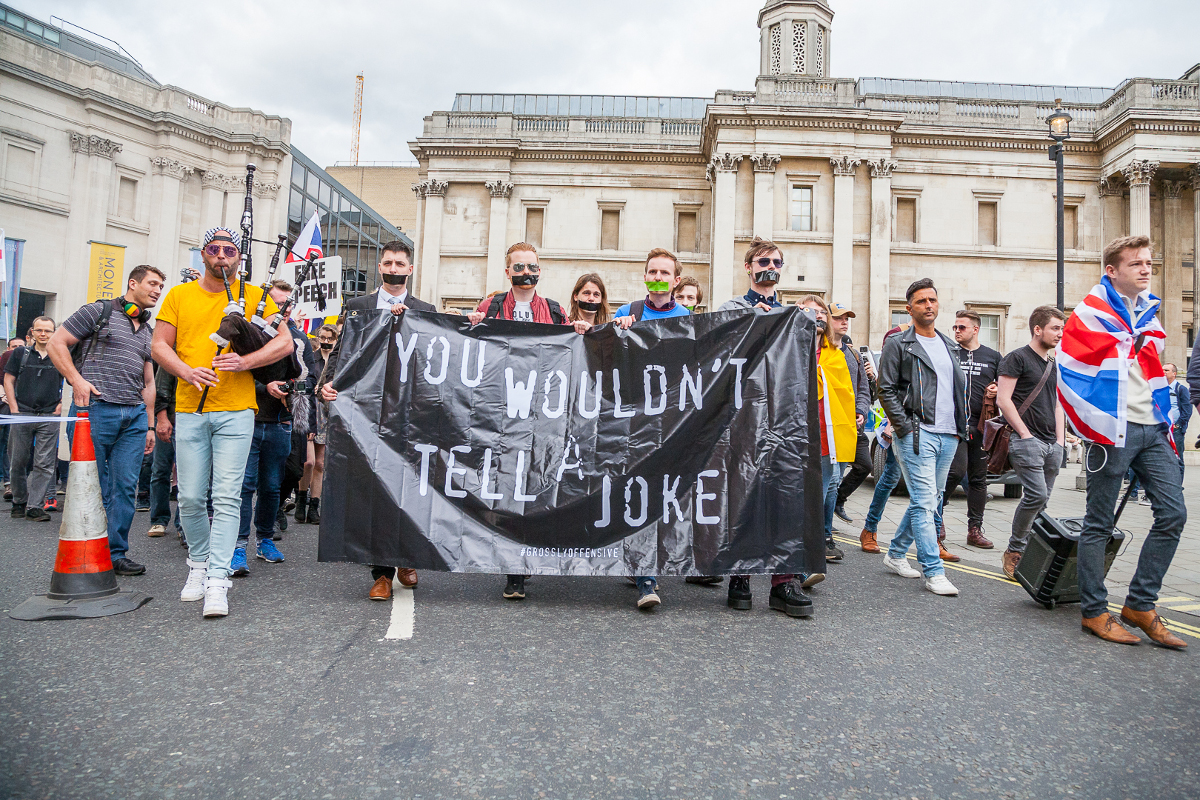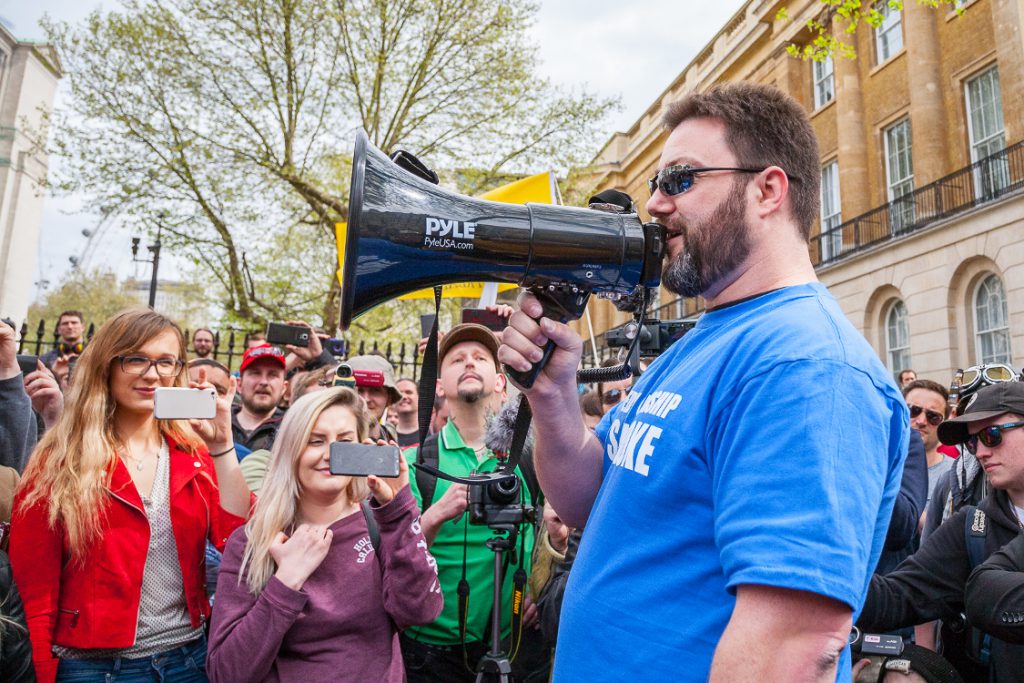Free Speech
Why We Marched to Defend Free Speech in the UK
Scottish people should have been a more visible presence, since the outcome of the case could curtail their freedom of speech.

Writers Helen Dale and Shazia Hobbs both attended the ‘Free Dankula’ protests on Monday April 23, Shazia in Airdrie, Scotland and Helen in London, England. Here, they report exclusively for Quillette.
Helen: I’m not sure speaking at a protest was ever on my bucket list but at least I can say I’ve done it now.
In circumstances I still find peculiar — outlined here to American journalist Tim Pool at 17:10 — I finished up speaking at the London ‘Free Dankula’ cum ‘Free Speech’ protest.
Shazia: I arrived at Airdrie Sheriff Court on Monday morning not knowing what sort of turn out to expect.
I was delighted to see lots of people had travelled from England to support Markus Meechan, but I was disappointed to see Scots hadn’t turned out in their thousands. Scottish law is different from English law and Scottish people should have been a more visible presence, since the outcome of the case could curtail their freedom of speech. This man was also at risk of ‘going in the gaol’ as Scots say.
At #FreeDankula march listening to @SargonOf_Akkad speak opposite Downing Street #FreeSpeech
St George's Day pic.twitter.com/tZdevfxUJT
— Alex Nieora (@GO_Ealing) April 23, 2018
Helen and Shazia: In the end, of course, Markus Meechan — aka ‘Count Dankula’ — didn’t go to gaol for his ‘Nazi pug’ video. That said, the £800 fine he copped probably makes it the most expensive joke in Britain. We have gone through some sort of looking glass, but from what to where is unknown and perhaps unknowable.
A man trains his girlfriend’s pet pug to do Nazi salutes in response to the trigger phrases ‘gas the Jews’ and ‘sieg heil’. At one point in the video he makes of this exercise, the pug — whose name is ‘Buddha’, by the way — is in front of a television screen as a Nazi rally plays. Police see the video on YouTube but are in a jurisdiction where police cannot bring prosecutions on their own motion. So they go looking for complainants — Jews who may be ‘grossly offended’ by what they see. The video is shown, presumably multiple times, to people who have not seen it and do not know of it. Some people are indeed offended and produce complaints, notably a Jewish Rabbi in Glasgow. The complaints are taken to the Procurator Fiscal, Scotland’s equivalent of the CPS or DPP.
It’s like the old joke: ‘Eugh! Look what I nearly stood in!’ [holds up dog shit in bare hand.]
The video joker is duly charged. He becomes famous. Many more people see the Nazi pug video. The video joker is convicted. He becomes still more famous, although in response to the conviction, YouTube ‘demonetises’ his videos, so he can no longer earn income from his fame. He is likely saved from a custodial sentence by the uproar surrounding his case. His story competes for headlines with the latest addition to the Royal Family. In words to chill the blood, during his sentencing statement, the Sheriff tells the joker the reaction by employers in the local area suggests that not only Jewish people found this material highly offensive: you say you lost a number of jobs as a result.
Helen has written elsewhere why she thought this prosecution utterly unworthy, damaging to freedom of speech but also of a type to reduce British law enforcement to a global laughing-stock. This time, it’s not only Americans — protected by the strong shield of their First Amendment — laughing at us. Other people are as well, even in countries with hate speech laws.
However, the law under which the charges were brought — Section 127 of the Communications Act 2003 — is not a hate speech law. In some respects, this makes it more dangerous. Hate speech laws — whether one agrees that ‘hate speech’ exists or not — are narrowly drafted. This is so because both common law and Roman law (‘civilian’) systems have long recognised that constraints on speech need to be narrow or civic life becomes impossible.
As originally enacted — in 1935, no less — Section 127 was to stop people harassing others by telephone. During the protest, Helen had to explain to one of the youthful organisers what it was like to be called up in the middle of the night and sworn at, or to have heavy breathing down the telephone. Subsection 2 of the Act is clearly directed to a sibling under the skin of harassing midnight calls: phoning the emergency services and telling them granny is doing the watusi on the living room carpet when in reality granny is alive and well and on holiday in Brighton.
Section 127 of the Communications Act has become one of the principal means by which the Internet is policed in the UK. It has done so with little debate about whether it is appropriately worded to deal with modern technology. It is one thing to protect individuals from ‘grossly offensive’ personal telephone calls. It is quite another to protect groups of people from what are in effect public performances. That it is now being used to regulate YouTube is frankly bonkers.
* * *
Helen: When I was invited to speak at the London protest, for a time it seemed I’d be sharing a platform with Tommy Robinson, which I admit gave me pause. Robinson — although he’s cleaned himself up of late — leaves a bad taste in a lot of people’s mouths, chiefly because he started out in football ‘firm’ culture and the EDL and has quite a rap sheet.
I had anxious friends contact me and suggest appearing on the same side was ‘bad for my reputation’, would ‘lose me my column at [x outlet]’ or even see me answering ‘please explains’ from my Conservative constituency association or the Law Society. There was also a risk his presence would attract Antifa, leading to a riot instead of a protest.
Robinson then went to Scotland to protest outside Airdrie Sheriff Court and my two concerns evaporated. Nonetheless, ideas don’t become wrong because of who believes in them. Guilt by association can get in the bin.
People marching were also not of a type commonly associated with protests. A few were in suits, but others waved American Gadsden flags, or the flag of an invented country, Kekistan. One joker had modified the Gadsden flag so the rattlesnake was transformed into a pug, with its tagline also altered: don’t tread on meme. London’s other main speaker was a man better known as ‘Sargon of Akkad’. Sargon of Akkad’s real name is Carl Benjamin, and he comes from Swindon (home to the Magic Roundabout). He invented the land of ‘shitposters’ known as Kekistan, although perhaps not their flag.

Benjamin’s Kekistanis were overwhelmingly young, wan in the weak spring sun and unfamiliar with the traditions of protest: they chatted amiably to Met officers scattered thereabouts. It took an older man, an obvious Boomer, to point a bullhorn at the police and shout. Later, Benjamin apologised for using a megaphone at the march’s terminus in front of Number 10. He was not, he said, the sort of annoying person who bellowed his amplified thoughts at unwilling listeners.
* * *
Shazia: Meechan and his girlfriend Sue — and Buddha the pug’s true owner — arrived at Airdrie Sheriff Court hand in hand. They walked past the press who had gathered, refusing to answer questions. I saw a cameraman from Sky News stick his foot out. It looked like an attempt at making Sue trip and fall.
The two of them waited outside the doors, Meechan smoking a cigarette. Supporters approached him, shaking his hand, wishing him good luck and asking for selfies. I asked him how he was feeling and he said, a little nervous. He kept his back to the paparazzi and camera crews the whole time; he didn’t want to give them a picture.
I spoke to police officers standing around the courthouse, waiting. They agreed the trial was farcical and a waste of police time and resources. They said they’d rather be out catching real criminals and solving real crimes.
* * *
Helen & Shazia: After Count Dankula was convicted last month, London comedy club ‘Comedy Unleashed’ decided to test whether the Nazi pug video was, in fact, funny. Directors Andy Shaw and Andrew Doyle don’t actually care one way or another. The three comedians have argued consistently that freedom of speech is the core issue here, otherwise the state finishes up arbiter of taste — something fatal not only to comedy, but to the arts more widely.
However, they were curious whether Dankula’s self-described ‘internet shitposting’ could bridge the gulf to live comedy. So, on 20 March they showed the video at their club — bookended with some comments by Comedy Unleashed’s compere, New Yorker Lewis Schaffer — and recorded the results.
* * *
Helen: After the protest finished, I went to a nearby pub with a couple of journalists. A somewhat agitated Andrew Doyle messaged me and asked if he could join us. What then followed — over the course of several hours, and came to include an experienced BBC cameraman, a second lawyer, and Carl Benjamin — involved working out whether Comedy Unleashed could upload the video to their YouTube page, and then tweet the link.
Uploading the video could enliven Section 127 1 (a) — the same provision that had just lightened Markus Meechan’s wallet by £800. Tweeting it could see Comedy Unleashed lose its Twitter account. One of Pie’s friends had already been permanently banned after tweeting a link to Meechan’s original video. The contagion could spread to anyone who re-tweeted it. First Pie, Doyle, and Shaw themselves (with 130,000 followers between them), then so on down the line.
I don’t recommend reading CPS prosecution guidelines on an iPhone screen after three pints of beer but even so, I was able to establish in England & Wales at least, uploading the video was unlikely to draw Plod’s attention and Comedy Unleashed was safe. Twitter, however, was another matter. There was no telling what it would do, and Pie — who often uses it to advertise ticket availability and extra shows — was particularly exposed.
The three decided to take the risk. The Comedy Unleashed ‘Nazi pug’ video — with Schaffer’s comments and audience reactions — is striking and well worth watching.
Also, occupying two £300-an-hour lawyers for half an evening so they could work out whether a comedy club could upload and tweet a link to a comedy video is, as Andrew Doyle observed, completely nuts.

* * *
Helen & Shazia: That Britain is a land of generational and class divides is a commonplace; the Tories nearly lost last year’s election because so many young people can’t afford a house. On Monday, we learnt of another divide, but this is within a single generation. The young people protesting were nothing like the moaning Millennials now staples of reportage and popular ‘youth-bashing’. They are literate but they do not have time for your sad story. Fed a steady diet of victimhood narratives at school, they have rejected the lot. Everything represents an opportunity for some ‘top kek’.
Many are ‘not posh’ in the broadest sense, hence the affinity for figures like Tommy Robinson and Markus Meechan and Sargon of Akkad. They’re often banned from online forums like Twitter or Facebook not because their ideas are particularly radical, but because their diction is insufficiently pure. Shazia, a working-class brown woman, has been suspended from Twitter repeatedly. This is partly because Scots swear, but largely because she isn’t ‘nice’.
Douglas K. Murray says things about Islam that, to our eye and ear, seem remarkably similar to things said by Robinson. But Murray went to Eton and Oxford and writes and speaks in the studied, oracular style perfected by the British upper-middle-classes. Robinson is an electrician who runs a tanning salon and once ran with Luton Town’s ‘firm’. Murray is on Twitter with his blue tick intact. Robinson has been perma-banned.
Shazia: We have become lazy in Scotland, too lazy to do anything about terror or rape-gangs, and lazy about standing up when people are trying to shut our speech down. That Braveheart mentality everyone thinks we’ve got: ‘You can take my life but you’ll never take my freedom?’ Only in films these days.
People outside Scotland don’t realise Markus Meechan has had his life destroyed for two years. He’s crowd-funded over £120,000 (£131K at time of writing) to fund an appeal because ‘I cannot allow the 2 years of litigation I went through and having my life put on hold, to happen to anyone else’. With top legal talent, there is a chance PF v Meechan may go the same way as the infamous ‘Twitter Joke Trial’, where a similarly ridiculous conviction was eventually quashed. That involved three appeals, though, before the UK judiciary finally located its sense of humour.
We may be here some time.






